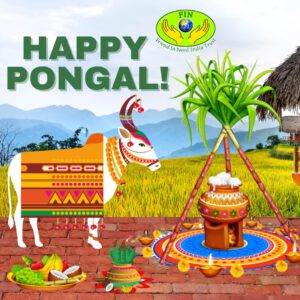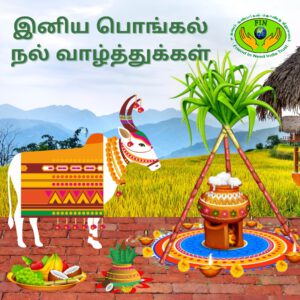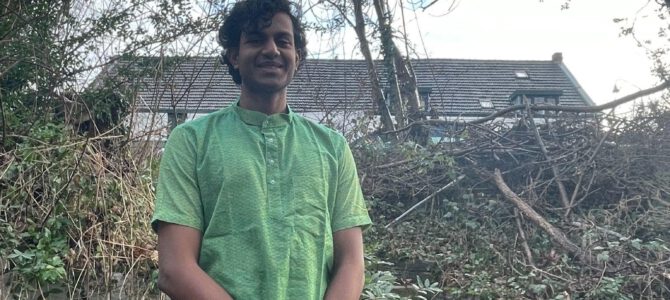Growing up in the center of Chennai in a joint family, Pongal was always an interesting time of year. Given how huge an affair it is, it extends the ‘festive season’ by a good two weeks into the (English) new year. It was always fascinating to see the entire city come to a grinding halt as millions headed to their hometowns. Pongal is also when I eagerly look forward to eating my grandmother’s Chakkarai Pongal (sweetened rice). That said, living in an urban household, Pongal at home is a relatively quiet celebration in comparison to the countryside.
Pongal is a festival of Tamils celebrated across four days. On the first day, houses are cleaned and old clothes are burnt. On the second day, we worship the Sun, grateful for its light. This is also when we boil milk and thank the natural elements for the past year and pray for continued abundance. The third day involves the worship of cows, who play a central role in agriculture and the rural economy. The final day, known as ‘Kaanum Pongal’ is a time to visit family and travel. Jallikattus (rodeos) also draw crowds to local fairs.
These four days are celebrated by millions of Tamils in South Asia as well as the increasingly global diaspora and form a key part of our identity. The festival ultimately marks the relationship between humans and nature and is especially important to the farming community. Despite not being from a farming background, we still celebrated Pongal and the family came together for these four days. As the state of Tamil Nadu gradually urbanizes, its cities seem to get less and less empty each passing year and the observation of rituals associated with Pongal seems to be in decline (at least in my eyes). Family gatherings have dwindled, and people do not wake up early in the morning to boil milk as the Sun rises. My peers seem less keen on the celebrations and the excitement has faded over the years. I wonder if this has to do with becoming adults or a disinterest in tradition.
My own ability to celebrate Pongal has been restricted the past few years as I moved away from Chennai to serve in the military in Singapore and then pursue my studies in The Netherlands. I was unable to use my leave in Singapore and had to attend classes in The Netherlands. Therefore, I questioned myself: ‘What does it mean for me to celebrate a festival strongly associated with rural life when I myself am a city boy?’ I had minimized my celebrations over the past three years as I intermittently attempted to search for an answer to this question. These reflections brought about new meanings to Pongal for me, which I appreciate much more today.
Firstly, as an aspiring environmental economist, I hope to work towards a more sustainable economic system and society. The Sun has been recognized as a source of energy since antiquity. The Sun was worshipped because of how it provided energy which plants then convert through photosynthesis, the fruits of which ultimately sustain us. Even in the era of modern technology, we still look towards the Sun as the source of energy, except now we install solar panels in the hope of a cleaner source of electricity. As such, even in the modern urban world that I grew up in, the Sun remains central to our lives. Thus, for me, Pongal becomes a time when I worship the Sun and express my thankfulness for its existence as well as for those who harness its energy (i.e. the farmers). It also acts as a reminder of why I chose the (academic) path that I am currently on.
Secondly, Pongal has been a key festival where I preserve my identity as an Indian Tamil. I have been privileged to be the globe-trotter that I am. Born in Singapore, growing up in Chennai, or studying in Maastricht, I have come to believe that identity is somewhat fluid and we wear different masks in different social settings. However, some aspects of my identity form an immutable core, and that includes my language, cultural heritage, and my beliefs. Pongal highlights one such belief, where man must be respectful towards nature and live in harmony with it, rather than view it as his/her world to manipulate. Pongal has thus played a fundamental role in ensuring that I continue to preserve my culture, even while I tweak the way I celebrate it depending on where I am as well as affirm these positive beliefs passed on to me.
Finally, Pongal has been a way for me to connect back home to my family. It is an excuse to call home during the week knowing they will be able to pick up the phone. More importantly, it allows me to see my grandmother smile when I show her my chakkarai Pongal and ven Pongal, made lovingly in Maastricht and shared amongst my non-Tamil friends. It continues to help me connect back to my people as a member of the wider Tamil diaspora and reflect on my (traditional) values and re-adapt them. For those of us who grew up in cities, Pongal must not be seen merely as some ancient harvest festival, but a time of year whose meaning can be redefined and its celebration renewed, rather than discarded and done away with. I wish you a happy and prosperous Pongal. I hope that your heart overflows with good intentions just like the pot of boiling milk.




